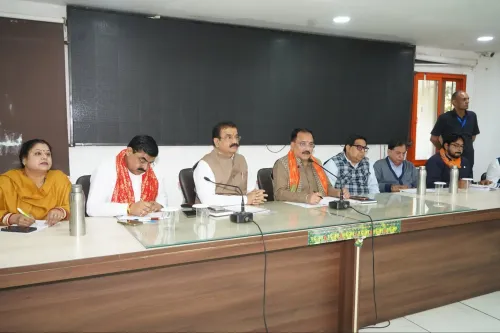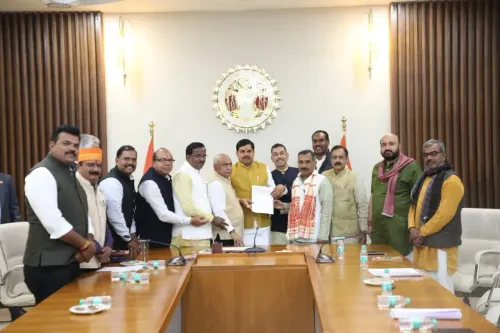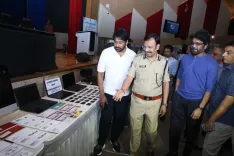Can India Legally Reject Hasina’s Extradition Request?

Synopsis
Key Takeaways
- Extradition Request: Bangladesh seeks the extradition of Sheikh Hasina and Asaduzzaman Kamal.
- Legal Grounds: India may have the right to refuse based on the Extradition Act and treaty clauses.
- Human Rights Concerns: Fair trial issues and political motivations are under scrutiny.
- International Relations: This case could strain India-Bangladesh diplomatic ties.
- Ongoing Tensions: Security concerns are rising in Bangladesh amidst political unrest.
New Delhi, Nov 17 (NationPress) – The interim administration of Bangladesh has made a formal request to India for the extradition of the former Prime Minister Sheikh Hasina and ex-Home Minister Asaduzzaman Kamal. Both individuals have been sentenced to death by a court for allegedly orchestrating violence against protesters during the student movement in July, as reported from Dhaka.
During a media briefing on the latest developments, legal advisor to the interim government, Asif Nazrul, announced that another extradition request letter will be sent to India for Sheikh Hasina.
Nonetheless, Aaditya Bhatt from Bhatt and Joshi Associates in Ahmedabad pointed out that “Section 31 of the Extradition Act, 1962, along with Articles 1, 6, and 8 of the India-Bangladesh Extradition Treaty (2013, amended 2016), provides significant legal basis for India to reject Bangladesh's extradition appeal.”
He further explained that while Article 1 sets a general obligation for extradition for crimes that carry at least one year of imprisonment in both countries, this obligation is conditional and subject to key exceptions outlined in the treaty.
In the meantime, Hasina has publicly denied the charges of crimes against humanity linked to the crackdown on student-led protests in 2024, asserting that she never commanded security forces to fire on demonstrators. She has labeled the verdict from Bangladesh’s International Crime Tribunal (ICT) as “biased and politically motivated.”
The ICT, established in 2010 under the International Crimes (Tribunals) Act of 1973, was initially meant to address issues of genocide, war crimes, and crimes against humanity during the 1971 Liberation War. Over the years, the Act has undergone amendments, with various sections being added and removed. It stipulates that the death penalty is the maximum punishment for those found guilty.
Kamal, who is also in exile in India, echoed Hasina’s claim that the ICT is “invalid and unconstitutional.” Bhatt noted that the “rushed tribunal proceedings,” trials in absentia, lack of independent legal representation, and the imposition of the death penalty following a regime shift raise serious concerns regarding the fairness of the trial and judicial independence.
“Article 8 allows for refusal if the request is not made ‘in good faith in the interests of justice’ or if the accused faces torture, cruel treatment, or a trial below international standards as defined by the International Covenant on Civil and Political Rights,” he added.
He further remarked that the prosecution of a former head of government within just 15 months of their removal, combined with the interim government’s explicit emphasis on accountability as part of its political agenda, necessitates examination of whether the intent is justice or political vengeance.
Additionally, he highlighted that these considerations are not just legal formalities but represent international human rights principles established in cases like Soering v. UK, which mandates refusal when there is a genuine risk of a blatant denial of justice.
Furthermore, he pointed out that “India's constitutional law, anchored in Article 21 of the Constitution, applies to all ‘persons,’ including foreigners,” emphasizing that liberty can only be deprived through just procedures.
Indian courts have consistently affirmed that individuals facing extradition are entitled to constitutional protections, which require independent judicial review to assess if the foreign legal proceedings meet essential standards of fairness. Given the political backdrop, procedural flaws, and issues surrounding capital punishment, the Bangladesh proceedings seem to fall short of these standards.
Meanwhile, tensions in Bangladesh are escalating, with Dhaka reportedly under tight security due to concerns over potential mass unrest.
Hasina, who has been the longest-serving Prime Minister of Bangladesh, was removed from power in August 2024 following extensive student-led protests against corruption, authoritarianism, and economic failures, which tragically escalated into violent clashes resulting in hundreds of fatalities.









